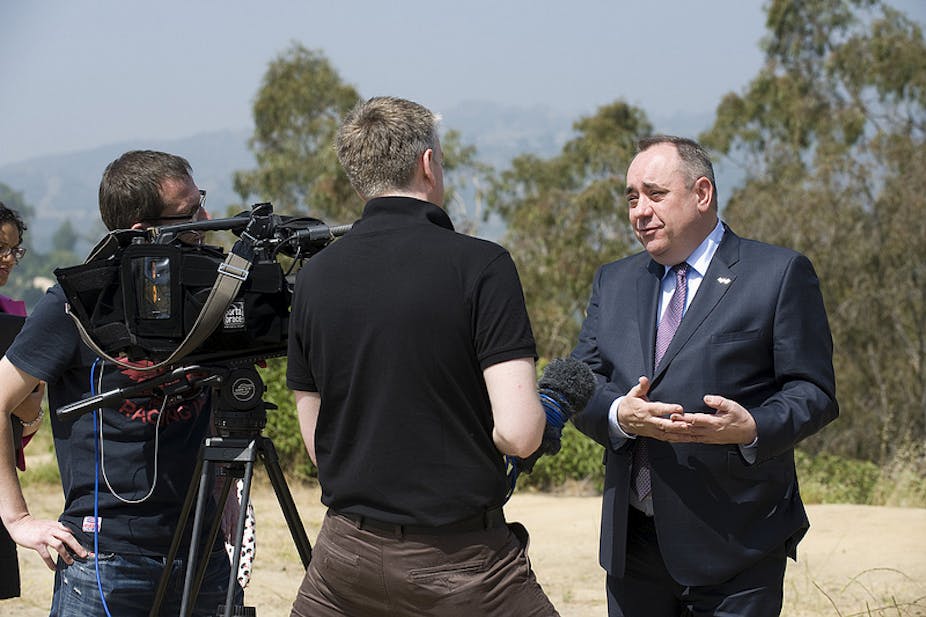Called to give evidence of possible BBC bias in coverage of the Scottish referendum campaign to the Scottish Parliament’s education and culture committee on 11 March, I prompted gasps from more than one member when I suggested that Lord Black, auditor general for Scotland, might not be entirely impartial in his opinion that pensions could be less affordable in an independent Scotland.
Lord Black is one of those elite commentators whose position and CV place him above criticism, it seems. While claiming no definitive knowledge of Lord Black’s views on Scottish independence, I insisted, to further tutting, that he would be a political animal just like the rest of us in the room.
It is now obvious that the same is true of the BBC’s Andrew Marr. During an interview with the first minister, Alex Salmond, Marr repeated the opinion of the European Commission president, Jose Manuel Barroso, that Scotland would find it very difficult, perhaps impossible, to rejoin the EU after independence.

Salmond showed a similar lack of regard for Barroso to that I appeared hold for Lord Black. The first minister referred to reports of Barroso’s rumoured ambition to become secretary general of NATO as a possible source of his desire to please the heads of members such as the UK.
Apparently flustered by Salmond’s destruction of the Barroso argument by citing various views that have been put forward since the Barroso/Marr interview, Marr made a mistake which instantly raised the question of BBC impartiality – again.
Marr opined: “I think it’ll be quite hard to get back in [EU membership] for Scotland, I have to say but let’s move on.”
Salmond pressed hard on whether Marr’s last statement was a personal view to be weighed against the many experts he had quoted. With much hesitation and despite the evidence of his own words, Marr reassured us that he has no opinion on this nor, interestingly, does the BBC.
The SNP has since complained to the BBC, which responded merely by accepting Marr’s clarification on air – though it was a lie to the camera – and a reassertion of the BBC’s impartiality.
BBC news – or views?
My own research has cast serious doubt on the impartiality of the BBC’s main evening news broadcasts in Scotland over the period of a year. In addition to a rough numerical imbalance of statements supportive of independence as opposed to those supportive of the union on a ratio of 3:2, there were other patterns undermining the yes campaign.
The tendency to begin with bad news stories for independence and so forcing the yes campaign on to the defensive, as opposed to the opposite sequence, occurred with a ratio of 66:24 on Reporting Scotland and 61:20 on STV. The undue deference towards politically motivated individuals and institutions advising against independence was also a notable feature. The first minister was also regularly depicted as dishonest or controlling.
So how did Marr compare? When he interviewed Ed Balls and George Osborne on Sunday, the exchanges were far more respectful than his tetchy, interrupting approach towards Salmond.
This was despite the fact that Salmond is a party leader and has a democratic mandate somewhat superior to the other two. Marr also had a tendency to narrow the debate to areas identified in the no camp as particular weaknesses in the yes campaign.
The European question is a particularly pernicious example. It beggars belief that democratic, affluent Scotland would be rejected by an organisation that has only recently embraced corrupt Eastern European states who are institutionally racist towards the Roma.
More recently the EU has been courting Ukraine, a country with abject poverty that is in the throes of an existential crisis. Yet the BBC allows this argument against independence in its “balanced” debate, along with the Monty Python-esque suggestion of borders and passports.
Marr presented the issue of currency union as a deal-breaker, just like in the reporting I covered. Yet there is evidence in, for example, a study by the Church of Scotland, that voters want to discuss higher values such as justice, compassion and tolerance as much as taxes or currency.
The emphasis on currency is an example of the sort of shallow materialism that the BBC allows to permeate the independence debate. Indeed, Marr headed in that direction right from the start of his programme when during a discussion of possible sanctions against Russia over Crimea, he reminded us that the City of London might suffer.
“We’ve been enjoying huge amounts of slightly dirty Russian money sloshing around,” he said.
Now it’s my turn to gasp. Leaving aside the nauseating acceptance of a system based on “dirty” money (which I suspect is not so slight and perhaps a bit bloody too), are we in it with the City of London, sharing its profits?
I digress. What Sunday’s Marr interview with Salmond told us was this: the strong evidence of bias that I have found in my research of BBC Scotland news broadcasts seems equally apparent at the UK end of the organisation, too.

